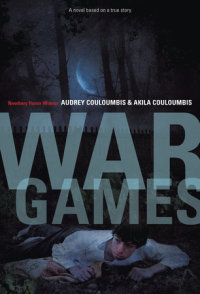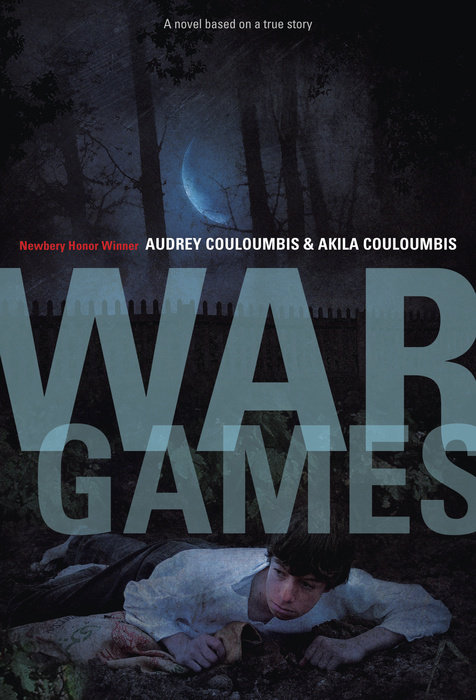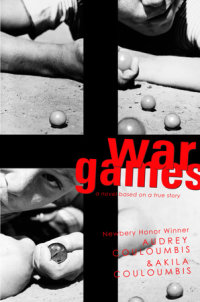War Games
1941. Greece. For 12-year-old Petros, World War II feels far away. But when the Germans invade Greece, the war is suddenly impossibly close. Overnight, neighbors become enemies. People begin to keep secrets (Petros's family most of all). And for the first time, Petros has the chance to prove himself to his older brother, Zola. Soon what were once just boys' games become matters of life and death as Petros and Zola each wonder if, like their Resistance fighter cousin, they too can make a difference. Based on the true story of Akila Couloumbis's wartime boyhood, Newbery Honor winner Audrey Couloumbis, writing with her husband Akila, explores what it was like coming of age in Nazi occupied Greece, and tells a story of family, friendship, and unlikely heroes.
An Excerpt fromWar Games
chapter 1
“I can hit the next three birds we see,” Zola said.
Petros shrugged. His older brother liked to make a contest of things.
They sat on a rock wall in the cooling green shade of the arbor, each with a small pile of stones beside his right hand. Above them, the weight of the grapevines rested on thick beams, the leaves trembling with the activity of so many small birds they could not be counted.
Zola made a confident sound with his breath and said again, “I can shoot three birds without missing.”
“Maybe you can,” Petros said, in a way that meant and maybe you can’t. Zola had just turned fifteen the day before Easter, making this the first of several unbearable months during which he would be three years older than Petros, instead of only two.
“If I do,” Zola said, “you do my chores for three days.”
A week ago, Zola made a parachute for his little white dog, using a basket and a small tablecloth. Petros told his brother it was a stupid idea. The dog would have nothing to do with it either.
Still determined, Zola had carried their sister’s rickety old cat up to the flat rooftop, where there was always a strong breeze. He put the cat in the basket and threw her off the house. The parachute worked. If the basket didn’t precisely float to the ground, it didn’t fall fast.
Best, it landed in a bush and the cat wasn’t hurt.
Worst, the basket landed in the bush in front of the window where Mama stood, looking out. Zola’s chores were doubled to keep him busy. Also, the cat scratched him. Stupid idea.
Now Petros scooped up a few stones and let them fall, tik, tik, tik. “Three days is too many.”
“Three birds.” Zola poked him with an elbow. “Three in a row.”
Petros wanted to poke him back but didn’t. “If you can do it, I can do it.”
“Then why haven’t you?” Zola asked.
“I never thought of it, that’s why.” If ever he had another choice of big brother, Petros decided, he would pick one less irritating.
Zola held his slingshot straight out and pulled back on the stone. He waited, his eyes searching for a target. The doves were big and slow. But they were Mama’s. She’d be angry if her birds got hurt.
They didn’t like to hit the many-colored finches, their favorites. And Zola dared not hit a swallow. A red blotch at the swallows’ throats was said to be a drop of the blood of Christ. Extremely bad luck came to anyone who hurt one of these birds.
That left only one worthy target. Sparrows were sharp-eyed and smart, and therefore nervous. Small and fast, they were hard to hit.
A bird moved through the tangle of vines. Zola let his stone fly, shooting through a space between the leaves. The bird dropped to the ground without a flutter.
“A lucky shot,” Petros said.
“An excellent shot,” Zola said, setting another stone.
“Excellent luck,” Petros argued. To send a stone through the knotted vines could be nothing else. Even so, Petros admired the shot.
Zola said, “I could do it again if a bird would land there.” Petros rolled his eyes. Of all the older brothers he knew, Zola was the worst.
A sparrow touched down where a vine hung below the arbor. The bird fell without waking Zola’s dog, only a few feet away. An ordinary shot, and Zola didn’t brag.
Again, the wait, watching. A careless target landed on a branch nearby. Zola got his third bird. “Ya-ha,” he shouted. “Three days!”
“No,” Petros said. “That was your bet. Here’s mine: I’ll kill two birds with one stone. Then you’ll do my chores.”
“For one morning,” Zola said agreeably.
“Three.”
“Two.”
“Three.” Petros felt in his pocket for a piece of shiny white marble, freckled with purple dots. Lucky, he thought, but he hadn’t tried it yet. As with all things lucky, the right time would come.
“Perhaps we’ll strike a bargain,” Zola said. “Right now you owe me three days.”
“I owe you nothing,” Petros said, “but two dead birds.”
He held out his lucky stone, easy to spot if it fell to the ground under the arbor. A blackbird landed in the garden outside the grape arbor and plucked a tiny beet plant. Petros set the stone into his slingshot and let it fly. The eager gardener fell over.
Petros ran over and picked up the stone. At the same time, their sister’s cat made a labored dash from a hiding place beneath the arbor to steal the blackbird.
The dash was more a matter of pride than necessity. The bird was too dead to put up a fight, the cat so aged she could hardly catch anything on her own. When the boys hunted, the cat ate.
As Petros turned, he saw a sparrow land on the grapevine above Zola. He aimed and, seeing the challenge on Zola’s face, shot. The stone nicked a stem on the branch the bird sat upon, cutting off a twig with two leaves that fell right on Zola’s head.
“Ha!” Zola cried.
“I can try again,” Petros said.
“No, you can’t,” Zola said. “It had to be two birds in a row.”
“I can do it, you know.” Petros had shot two birds in a row before.
Zola grinned. Switching from English to Greek, he said, “Here comes Stavros. Hit that bird and you don’t have to do my chores.”
Their cousin walked the mile from the village of Amphissa once or twice a week. He saw them in the shadows and pulled his own slingshot from his pocket.
“Don’t tease him,” Petros said.
Zola shrugged. Then he started trouble with his next breath. “I hit three birds in a row,” he said, “and Petros could not.”
“I said I would hit two birds with one stone.” The rock with purple spots hadn’t been so lucky after all, but it was still interesting.
Stavros leaned in to Petros and said out of the corner of his mouth, “Perhaps Zola was just lucky.”
“I can do it again anytime,” Zola said. “I can do it now.”
“So do it,” Stavros said, daring him.
“You do it first,” Zola said. “If you can’t, why should I bother?”
Stavros let his brows lower to cover his eyes like a shelf. Zola wouldn’t let Stavros win and Stavros couldn’t bear to lose. “Never mind,” Petros said to them. “We’ve scared away the birds.”
Zola said, “I have something else to do anyway.”
Petros wanted to kick Zola. It was just like his brother to make Stavros mad and then leave Petros to smooth the ruffled feathers. He hoped Zola hadn’t ruined Stavros for the day.


